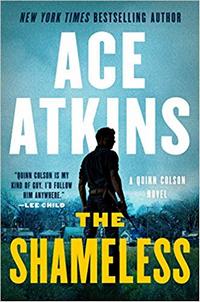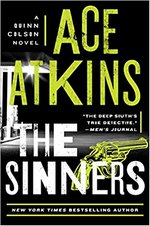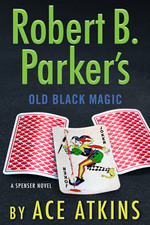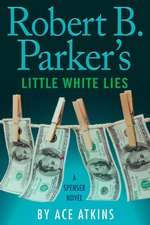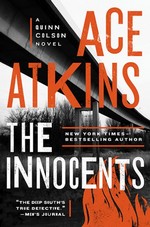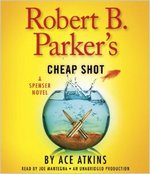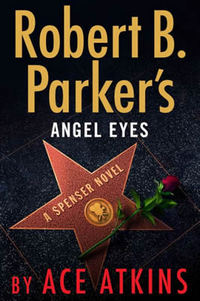 |
Robert B. Parker’s Angel Eyesby Ace Atkins Hardcover, 305 pg. Read: November 20-21, 2019 |

In the passing light, I noticed the welts on her wrists, chapped and bloody.
She’d been tied up for a long time.
Chollo noticed them, too.
“Should we kill him?” he said.
“Too easy.”
“You will never change, amigo,” he said. When will you learn? Some people live without rules. And sometimes killing a bad man is the only way.”
“I have other ideas for [him].”
Chollo nodded. “And I am listening”
The day that Hawk, Chollo (and a few others) stop trying to convince Spenser to just kill the bad guy and be done with it—or the day that he listens to them—is the day we’ll all know the series has run its course. Which will hopefully be around the time my future grandchildren start reading the series.
But far before we get to that point, we should probably start at the beginning.
A friend of Susan’s is worried about her daughter, who lives in L.A. and has gone missing. She’s beside herself, so Spenser flies out to find her with Zebulon Sixkill’s help. The book opens with Spenser and Z being let into Gabby’s apartment by her ex-boyfriend and still-agent, Eric Collinson. Collinson is typically the kind of twerp that Spenser would enjoy messing with, but he’s on his best behavior (probably to keep Collinson talking).
Collinson keeps insisting there’s nothing to worry about, that Gabby’s probably just off on a quick Mexican vacation or something. Still, he surreptitiously leaves her laptop behind for Spenser to “find.” Between what Z’s tech-wizard friend finds on the laptop, what Z and Spenser get from the LAPD (in the person of our old acquaintance Samuelson) and Gabby friends/former boss, there are two avenues of investigation for them to dive into. A powerful studio executive and a multi-level personal development group that’s somewhere in-between Scientology and NXIVM (far closer to the latter). But before they can dig too far into things, some heavies representing a third party show up and the lead starts flying.
And I ate it all up.
It’s dangerous enough that Z isn’t enough to help Spenser out. Chollo (now a small-businessman), Bobby Horse and Mr. del Rio put in appearances and render assistance in varying amounts.
I could easily keep going along these lines for 6-10 more paragraphs, but I’d better show some restraint and leave things there and move onto other parts of the book.
In addition to the hunt for Gabby, we get a little bit of Spenser’s jaded view of the entertainment industry (largely in the same vein as we saw in A Savage Place and Stardust, just up-to-date); a lot of references to movies and stars that are so irrelevant to contemporary Hollywood that most of the characters don’t get them; and a very jaded (but likely accurate) look at “The Industry” post-#MeToo.
Also, we get a hint or two at what Z’s been up to since he left Boston and Atkins has completely left the possibility open for someone to start a Sixkill series, already populated with a cast of characters to carry a book or two. I’m ready to buy at least 5 of them in hardcover right now.
The last little things that I’ll mention are that we get a nice update on Mattie Sullivan, but we need to see more of her soon. Plus, there’s a cameo that filled my heart with joy here—that’s all I’m going to say about it.
Atkins is in fine form, which comes as no surprise to anyone. I didn’t spend too much time comparing him to Parker as I read it, but you can’t help but do it. It’s a fast, breezy style, but there are depths to be plumbed (unlike several of Parker’s latter Spensers). It’s just a pleasure to bask in the language, dialogue, and characters.
At this point, when it comes to an Atkins Spenser novel, it’s really just a question of how much I’m going to like it, it’d be impossible (I wager) for him to deliver something that I won’t like. I liked this one plenty. A fine story, a setting the character hasn’t been in for a while, a chance to catch up with old friends . . . Angel Eyes is as satisfying as you could ask for. Could you start with it? Sure. You wouldn’t get all of the references, but none of them would impact your appreciation of the story. The only danger in starting with Angel Eyes is that you’d probably feel compelled to go back and read the previous 46. Which actually sounds like a lot of fun to me.
I hemmed and hawed over the stars on this one. If I had a 4 1/4 graphic, I probably would’ve employed it. My initial impulse was 4 Stars, but when I stop and think about: there was one page where I laughed out loud (at least a chuckle) multiple times (I really want to talk about it in detail, but don’t want to ruin anything); the way Atkins pulled in every L.A. reference possible (plus some other Spenser-canon references) without making it feel like checking off a list; and the feeling of dread and worry Atkins was able to elicit (which really doesn’t happen all that often in long-running series)…I’ve gotta give it that extra bump (and now that I’ve actually written that list, I’m thinking of bumping it up another).




